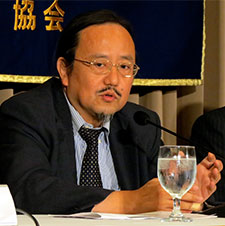It doesn’t take a baseball bat to silence a reporter in Japan–increasingly the blunt weapon being wielded by corporations, power brokers, and politicians is the court gavel.
In May of this year, a writer for the weekly magazine Shukan Kinyobi was sued by one of Japan’s most powerful nuclear industry figures, for a total of 67,000,000 yen (US$858,000). The thrust of the lawsuit is that the term used to describe the plaintiff is libelous.
This is a landmark case because it is the first time that a journalist has been sued over an article, but not the magazine which published it. It is a clear attempt to bully the individual reporter and to create a rift between freelance journalists and the periodicals that run their stories.
Reporters working for major newspapers or media outlets in Japan are usually part of Japan’s press club system, which allows them great access to government agencies and protects them to some degree. Newspapers like the Yomiuri Shimbun and others have the power of millions of readers and ample finances to shield their reporters from lawsuits of this ilk, but independent journalists do not.
The individual being sued is Minoru Tanaka, age 52, an investigative journalist who has long written about Japan’s problematic nuclear industrial complex, known as “the nuclear village,” composed of utility firms, politicians, advertising agencies, and retired bureaucrats. His article–which touches upon the deep collusion between the president of a nuclear safety company, Japan’s nuclear industry, politicians, and possibly even organized crime–was published in the Dec. 16, 2011, issue of the magazine. .
All the materials Minoru Tanaka used for his article were available in the public domain. The plaintiff, Shiro Shirakawa, president of the nuclear safety company New Tech, launched a lawsuit against Tanaka in May, complaining that the word Tanaka had used in his article to explain the role of Shirakawa as a nuclear “fixer” was insulting and defamatory. In Japan, the term fixer means someone who arranges profitable business deals often using dubious methods. It has a negative connotation but is also used in the sense of the word “middleman” or “organizer” in the popular vernacular.
The plaintiff demanded Tanaka pay a total of 67,000,000 yen in damages and attorney fees.
This act of targeting one single individual and the fact that the plaintiff is much more powerful financially and politically makes the case a strategic lawsuit against public participation, or SLAPP, according to Tanaka and the publisher of Shukan Kinyobi, Hajime Kitamura.
The lawsuit is in the preliminary stages and a verdict is expected next year.
After the latest hearing at the Tokyo District Court, Tanaka said, “The mainstream Japanese press has still not touched the story, probably for fear of financial damages.”
He said one of the reasons that support for him is not widening at a rapid pace is because of the existence of the press club, or the Japanese Kisha Kurabu system. “The major media outlets that are part of the press club system do not welcome freelance or individual writers because they want to monopolize information for themselves. They are not very supportive of individual journalists,” Tanaka said.
Off the record, a reporter for a major television network in Japan affirmed this, saying, “There is no upside to writing about this case and the plaintiff has ample resources to make further nuisance lawsuits.”
But a growing number of people are supporting Tanaka today, because it is not only his problem, but a problem for freedom of the press in Japan. Many reporters think there should be laws to limit or suppress SLAPP lawsuits. For the time being, it’s never been more expensive or risky to be an independent reporter in Japan, especially for those who write under their real names rather than pen names or initials. Already, some weekly magazines have a practice of writing articles about scandals without using the name of the main persons involved, while naming others unlikely to sue or cause problems. A classic example of this was the Shukan Shincho article in September of 2008, about the lavish birthday party of the Yamaguchi-gumi crime boss, Tadamasa Goto, attended by some of Japan’s famous singers and celebrities. The celebrities in attendance were named; the crime boss was not.
The detrimental effect of the lawsuit could be immense. Unfortunately, the mainstream Japanese media is more concerned about the short-term financial costs of reporting on the trial, with very little consideration of the long-term costs for journalism in Japan.
Questions sent to Shirakawa via his firm on justification for the lawsuit or why there was such a delay between publication and legal action were not answered.
Nathalie-Kyoko Stucky was an assistant correspondent for the Jiji Press in Geneva, covering the United Nations. She is now a freelance writer in Tokyo who has written for AFP, The Independent, Jane’s Intelligence Review and the Atlantic Wire.
Jake Adelstein is an investigative journalist, consultant, and the author of Tokyo Vice: An American Reporter on the Police Beat in Japan and former Yomiuri newspaper staff reporter. He currently writes for the Atlantic Wire and The Daily Beast.
